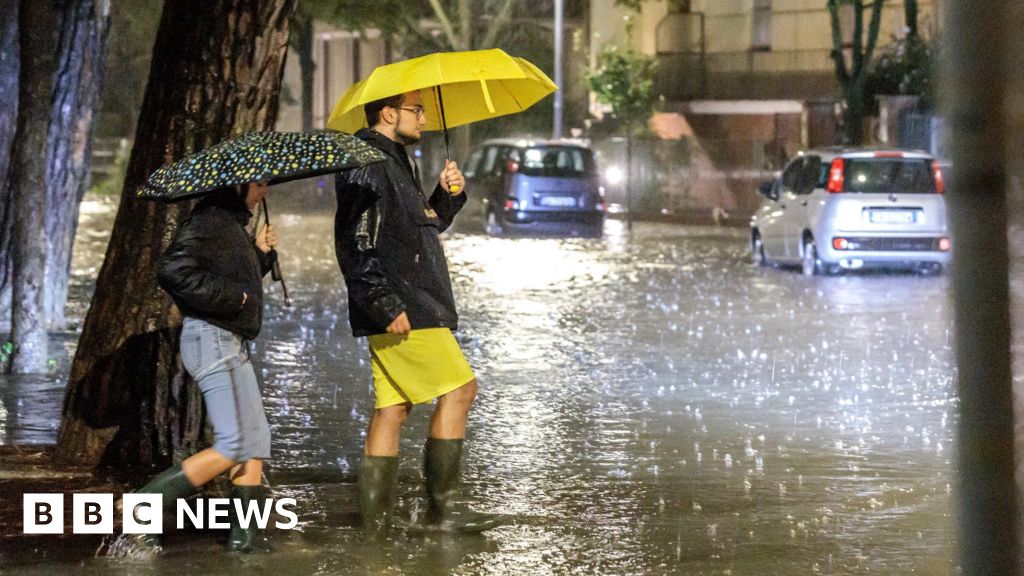World
Death toll reaches 16 as ‘dramatic’ flooding in central Europe continues

The death toll from torrential rain and flooding in central and eastern Europe has risen to at least 16, with several more people missing, as authorities reported deaths in the Czech Republic, Poland and Austria and warned the worst may yet be to come.
The Czech police chief, Martin Vondrášek, told local radio on Monday that a woman had drowned in a stream that overflowed its banks near Bruntál, a town of about 15,000 people in the north-east of the country, while seven more people were still unaccounted for.
In Austria, local media reported that two men aged 70 and 80 drowned after being trapped by rising flood water in their homes in the towns of Böheimkirchen and Sierndorf, both in the hard-hit north-eastern state of Lower Austria.
The number of victims in Poland rose to six after a surgeon returning from hospital duty drowned in the south-western town of Nysa and four people died in the southern towns of Bielsko-Biała and Lądek-Zdrój, firefighters said.
Hundreds of thousands of people have been evacuated from their homes across a swathe of Austria, the Czech Republic, Hungary, Romania and Slovakia as Storm Boris unleashed what one mayor described as a “catastrophe of epic proportions”.
Flooding has burst dams, flooded streets, knocked out electricity and in some places submerged whole neighbourhoods. “I have lived here for 16 years and I have never seen such flooding,” one Austrian woman, Judith Dickson, told public radio.
Six people died in Romania over the weekend, as well as one in Poland and a firefighter in Austria. The rain was expected to ease on Monday but, with some rivers unlikely to reach peak water levels for days, several major cities were preparing for potentially disastrous flooding.
Poland’s prime minister, Donald Tusk, convened an emergency cabinet meeting to speed up financial and other support to victims, while his counterpart in Hungary, Viktor Orbán, cancelled all international engagements.
The German chancellor, Olaf Scholz, described images from the flooded areas in Austria, the Czech Republic, Romania and Poland as “dramatic” and said Germany was “deeply saddened by the news of dead and missing people” and ready to help.
Hungary’s capital, Budapest, was racing to ready itself for severe flooding as the Danube rose, as was Slovakia’s capital, Bratislava. The Austrian chancellor, Karl Nehammer, said the situation “continues to worsen”, particularly in Lower Austria, which has been declared a disaster area.
More than 10,000 relief workers had evacuated 1,100 houses in the state, he said. Lower Austria’s governor, Johanna Mikl-Leitner, said many people there were facing “difficult and dramatic hours … probably the most difficult hours of their lives”.
The municipality of Lilienfeld, with about 25,000 residents, was completely cut off from the outside world, local media reported. So far 12 dams have broken and thousands of households were without electricity and water, authorities said.
The Czech prime minister, Petr Fiala, urged people to “follow the instructions of mayors and firefighters”. As of Sunday evening, he said, emergency services had dealt with 7,884 incidents and 119,000 households were without power.
At least 12,000 people had been evacuated from their homes across the country, Fiala said, adding that although the rain had stopped in the most affected areas, the situation would become critical for others as the storm moves westwards and rivers continue to rise.
“Very difficult days for many people, unfortunately, continue,” Fiala said on Monday, with 207 areas across the country facing flood conditions. The most critical situation was in southern Bohemia, he said, adding: “Please be careful and responsible.”
The rising Morava River put about 70% of the Czech city of Litovel, 140 miles (230km) east of the capital, Prague, underwater overnight, its mayor told local media, shutting down schools and health facilities.
In the country’s third biggest city, Ostrava, a power plant supplying heat and hot water to the city was forced to shut down. Thousands were evacuated from their homes in Krnov and Český Těšín.
In Opava, up to 10,000 people out of a population of about 56,000 were asked to move to higher ground. “There’s no reason to wait,” the mayor, Tomáš Navrátil, told Czech public radio, saying the situation was worse than during the last devastating floods in 1997, known as the “flood of the century”.
Romania’s prime minister, Marcel Ciolacu, said the country would “clean up and see what can be salvaged”, adding that compared with the worst recent flooding in 2013, “the amount of water was almost three times bigger”.
One resident of the Romanian village of Pechea, in the stricken Galati region, told Agence France-Presse: “The water came into the house, it destroyed the walls, everything. It took the chickens, the rabbits, everything. It took the oven, the washing machine, the refrigerator. I have nothing left.”
The president of the European Commission, Ursula von der Leyen, expressed solidarity with those affected by flooding and she said the EU would provide support.










